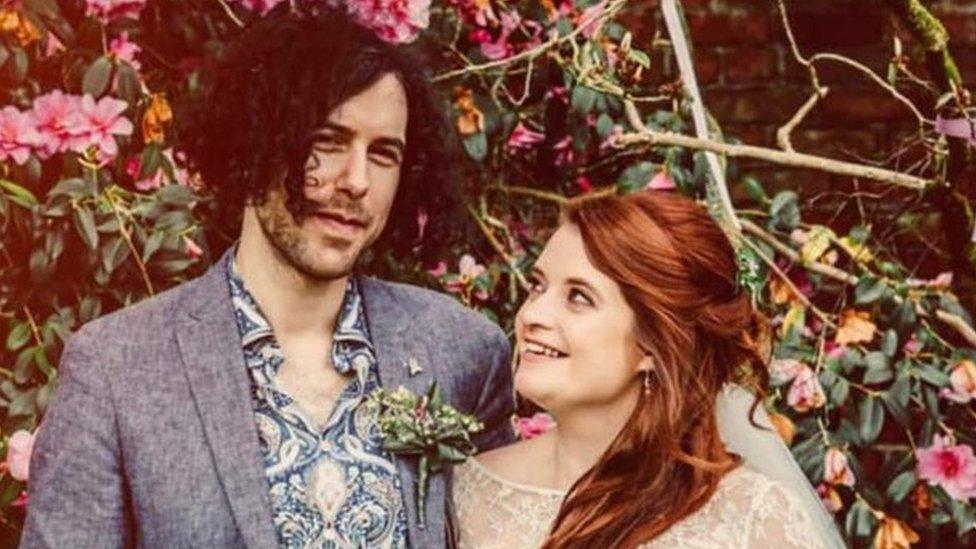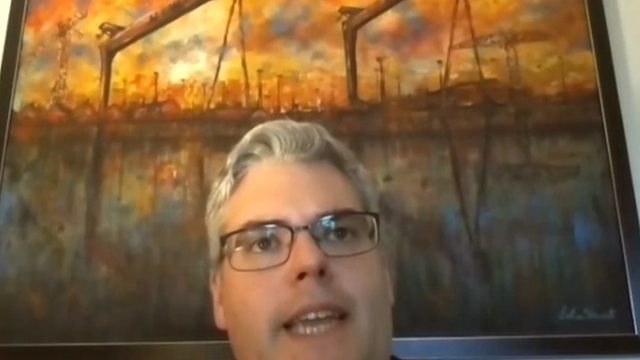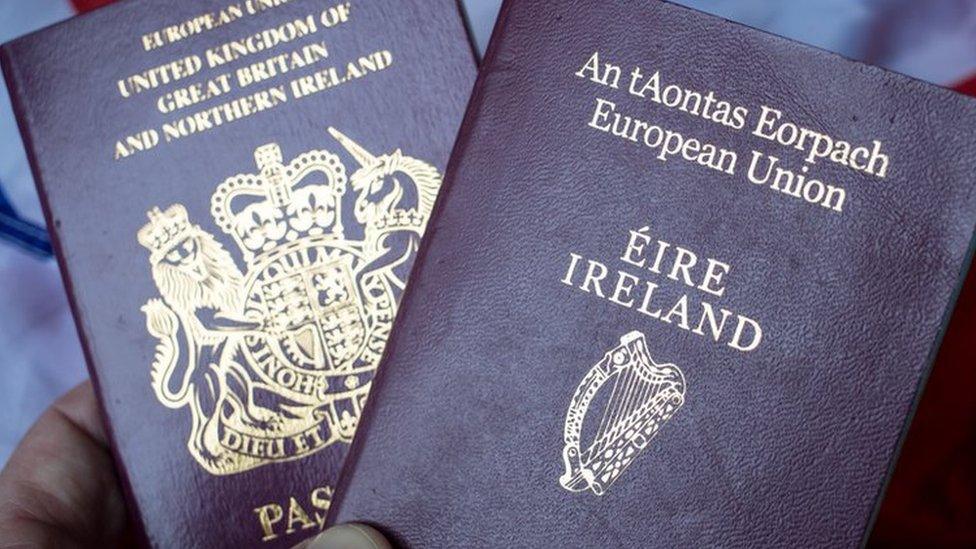Emma DeSouza hits out over DUP MP's Irish citizenship comments
- Published

Emma DeSouza with her husband Jake
A woman who took a legal case over citizenship says a DUP MP's comments about British and Irish citizenship are "inconsistent" with the GFA., external
Gavin Robinson said that for those born in NI the right of Irish citizenship was "in addition to British citizenship" not instead of it.
He was speaking in the House of Commons on Monday.
Emma DeSouza said that Mr Robinson had "sought to place a British identity above an Irish identity".
His comments were made during the second reading of the Immigration and Social Security Co-ordination (EU Withdrawal) Bill., external
The Good Friday Agreement (GFA) recognises that people born in NI can identify as British, Irish or both., external
Ms DeSouza, from Londonderry, took a legal case when an application for a residence card for her US-born husband was rejected.
In 2015 the Home Office said no, deeming her British, but she had never held a British passport.
They requested she either reapply as a British citizen or renounce her British citizenship and pay a fee to apply as an Irish citizen.
However, last week a move was made by the Home Office to change how its immigration rules affect people in Northern Ireland.
The government said family members of British or dual British-Irish citizens from Northern Ireland will be able to apply for status through a post-Brexit residency process, known as the EU settlement scheme.
Until then, the government had maintained that people born in Northern Ireland remained British under the law, even if they identify as Irish.
'Heart of the principle of consent'
Mr Robinson expressed "concern at the government's recent decision to amend the settlement scheme to allow family members of British and British-Irish citizens dual citizenship".
"This was intended to placate certain aspects whose spouse, partner are a British citizen as a result if being born in NI and therefore were not eligible for what is a scheme explicitly for EU27 nationals," he told the HoC.
"The reality is that citizens born in NI under the Belfast Agreement have the right to both Irish citizenship and British citizenship, but it's in in addition to British citizenship not instead of it," he added.
He said the issue strikes "to the very heart of the principle of consent".
Ms DeSouza told BBC News NI that to "state that the people of Northern Ireland are all British whether they want to be or not flies in the face of those principles [of the GFA]."
"He can think that personally but when you're representing people you should not be making those kind of comments in public," she said.
Alliance Party MP Stephen Farry told the Nolan Show there was a difficulty with the issue because of the 1981 British Nationality Act., external
"It has not been updated to take into account the provisions of the The Good Friday Agreement around identity," he said.
"Up until now because both the UK and Ireland have been part of the EU a lot of these issues haven't been exposed as people had the same degree of rights as EU citizens.
"It's only now when you strip off the covering on the back of the TV and you see the wires exposed you see the complexity around identity," he added.

Mr Robinson was speaking during the second reading of the Immigration and Social Security Co-ordination (EU Withdrawal) Bill
Mr Robinson's comments were criticised by some politicians.
SDLP leader Colum Eastwood tweeted: "Sorry Gavin, you don't get to determine my identity".
Sinn Féin Senator Niall Ó Donnghaile claimed Mr Robinson's comments showed "a complete lack of understanding of the Good Friday Agreement".
Allow X content?
This article contains content provided by X. We ask for your permission before anything is loaded, as they may be using cookies and other technologies. You may want to read X’s cookie policy, external and privacy policy, external before accepting. To view this content choose ‘accept and continue’.

Timeline of the case
Mrs De Souza applied for a residence card for her US-born husband, Jake, in December 2015, making the application under her Irish passport.
However, the Home Office rejected the application as it deemed Mrs De Souza was British, even though she says that she never held a British passport.
They requested she either reapply as a British citizen or renounce her British citizenship and pay a fee to apply as an Irish citizen.
But she challenged the decision, citing the Good Friday Agreement's terms that assert her ability to identify as Irish, British or both.
In 2017, a judge said Mrs De Souza was an "Irish national only who has only ever been such" and the following February, the first tier tribunal ruled in favour of Mrs De Souza.
Later in 2018, the Home Office lodged an appeal and the case was heard by a panel of judges in the Upper Tribunal court in September 2019.
After the tribunal upheld the case in the government's favour, Mrs De Souza said she would take the case to the Court of Appeal in Northern Ireland.
That hearing is scheduled for 25 June.

- Published23 February 2019
